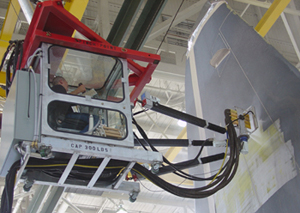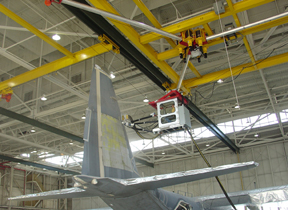A revolutionary robotic platform developed by the National Institute of Standards and Technology (NIST) has been adapted for the U.S. Air Force to address the critical, expensive, and nasty work of stripping old paint from large aircraft. The robot’s work platform, which “floats” in mid air suspended by a web of computer-controlled cables, promises to drastically reduce paint-stripping time per airplane, cut costs and lessen incidents of operator stress and injury.
 |
|
A worker in a protective cab on a NIST-developed revolutionary robotic platform strips paint off a U.S. Air Force C-130. The easily maneuverable platform, that uses computer-controlled cables to "float" around the aircraft, promises to drastically reduce paint-stripping time per airplane, cut maintenance costs and lessen incidents of operator stress and injury.
Credit: Photos by N.E. Wasson Jr., U.S. Technology Corp.

|
Air Force maintenance rules require that the coatings on large aircraft be stripped off and replaced every five to six years. The stripping process is difficult and hazardous, filling the air with toxic dust and vapors. The task is currently done by maintenance workers in hot, movement–inhibiting protective suits climbing on scaffolding erected around the airplane. Using the new “Aerial Multi-axis Platform” (AMP), a worker in a protected cab can operate the automated high-pressure blast nozzles of the paint-stripping machinery, moving easily around the aircraft suspended from the aircraft hanger’s ceiling. This robotic approach allows the operator to guide several concurrent nozzles, vastly improving productivity over the conventional single nozzle, hands-on approach. The AMP uses NIST’s RoboCrane® technology in which six hoist cables from three upper support points tautly support, stabilize, and maneuver the work platform. It eliminates the need for scaffolding and other ground-base equipment that is time consuming to set up and hinders other operations within the hanger.
The AMP was adapted for aircraft maintenance operations by NIST in partnership with the U.S. Technology Corporation, with sponsorship from the Air Force Research Laboratory (AFRL). According to AFRL’s Manufacturing Technology program, the AMP dramatically improves the quality and productivity of the paint stripping operations—one third of the overall maintenance process. Tests demonstrate that a worker with the AMP can strip up to 10-20 square feet per minute. A single operator can comfortably work an entire eight hour shift rather than taking the frequent breaks needed with the current de-painting process. The AMP design reduces the process time to strip old paint from an aircraft by 40-50 percent, the equivalent of four to five days for a C-5 aircraft.
Two production AMP systems are being installed at the Air Force’s Warner Robins Air Logistics Center in Georgia for C-130 coating removal. The technology also is expected to be of use to the commercial aircraft industry.
http://www.nist.gov